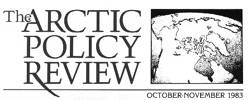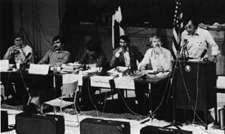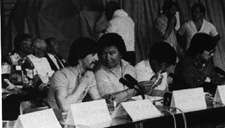 |
|
|
Mark Gordon, vice-president of Northern Quebec’s Makivik Corporation, confers with Joseph Padlayat, president of Canada’s government-funded Inuit Broadcasting Corporation.
|
| Peter Ittinuar, Member of Parliament for Nunatsiaq, addresses the ICC. A prominent figure in Canadian constitutional revisions, Ittinuar had just completed a tour of the Northwest Territories with Prime Minister Trudeau. A week after the ICC meeting, Ittinuar announced his bid for re-election. |
|
After the presentation of a compendium of previous ICC resolutions relating to Arctic Policy drawn up by the ICC executive council, the delegates retired to working group sessions to produce thirty resolutions that were passed by the General Assembly. The Assembly also adopted an additional five resolutions presented by the newly-founded ICC Elders’ Conference. Together, they form the basis for an ICC Arctic Policy.
INTERNATIONAL ARCTIC POLICY DEVELOPMENT
83-03 Soviet Participation in the ICC
The ICC establishes a special membership status for the participation of Soviet Inuit in the Executive Committee, until such time as these Inuit are able to establish official membership in the ICC.
83-13 ICC-NGO Status
The ICC Assembly gives full support to the ICC-NGO consultative status at the UN and calls for fulfillment of its international responsibilities.
83-17 Circumpolar Science and Research
Provides for the establishment of an International Scientific Commission for the purpose of aiding the coordination and dissemination of circumpolar research as a means of supporting Inuit interests. This resolution was accompanied by a Declaration on Inuit Research and Science which lists principles by which arctic research should be managed.
83-28 U.S. Arctic Research and Policy Act
Calls upon the U.S. Congress to guarantee the participation of Alaska Inuit in U.S. arctic research policy.
83-30 Circumpolar Arctic Policy
Formulates the basic principles which the ICC brings before circumpolar nations in the development of an international arctic policy.
ENVIRONMENTAL PROTECTION
83-01 Arctic as a Nuclear-Free Zone
The ICC calls for a nuclear-free zone in the Arctic, with bans on nuclear testing, missile deployment, uranium mining, nuclear waste dumps, and “nuclear devices” including atomic energy plants.
83-07 Norton Sound, Alaska
The ICC calls upon the U.S. government to give “proper concern to the protection of the Inuit way of life in the Norton Sound, Bering Sea region by voiding leases sol in Oil and Gas OCS Sale No. 57.” The U.S. has recently sold leases to the oil industry to explore and develop oil and gas reserves in the Norton Sound, despite the objection of 75 communities dependent upon the Sound’s environment.
83-12 North Slope, Yukon
The ICC calls upon the Canadian government to prohibit facility siting, rights-of-way, corridors or any similar works from being established on the Yukon-Beaufort Sea coast without settlement of land claims in the area.
83-14 The Canada-Denmark Marine Environment Agreement
The ICC calls upon the governments of Canada and Denmark to include the Inuit in current negotiations leading to cooperative marine management.
83-15 Migratory Birds
the ICC supports the Inuit peoples of Canada and the U.S. in their efforts to secure Inuit participation in the management of migratory birds and the implementation of the Protocol on Migratory Waterfowl.
83-21 Circumpolar Environmental Principles
The ICC stated basic principles concerning the Arctic environment, including the Inuit right to manage and participate in the decision making of the circumpolar environment; that no major development take place in the Arctic unless there are environmental and social impact statements made acceptable to Inuit; and that Inuit use of renewable resources of the Arctic must take priority over other uses.
83-22 Oil Spill Response Standards
The ICC calls upon governments to join with the ICC to develop specific standards for arctic and sub-arctic oil spill response standards and methods before any exploration can be allowed in the circumpolar region.
| Philomen Tutiakoff, left, Chairman of the Aleutian-Pribilof Islands Association, and Mike Pagano, Board Member of Koniag, Inc., the Kodiak Island regional Native corporation, attended as official observers of organizations considering ICC membership. |  |
|
|
Mary Simon, President of Makivik Corporation, the Northern Quebec Inuit land claims organization, shares her feelings on retiring from the ICC executive committee. |
83-06 Inuit Art
The ICC requests the government of Canada to introduce legislation to outlaw imitations of Inuit art which devalues the price and integrity of art pieces made by the Inuit.
83-09 ICC Elders Conference
The ICC approves the creation of a continuous, permanent, Elders’ organization within the ICC to be called the ICC Elders’ Conference. The five Elders’ Conference resolutions are:
E-01-83: Calls upon the ICC to establish the ICC Elders’ Conference.
E-02-83: Resolution on Alcohol and Drug Abuse.
E-03-83: Resolution on Inuit Education calling for mandatory Inuit language and traditional skills programs.
E-04-83: Language, Education, and Culture. Supports ICC resolution 77-04.
E-05-83: Inuit Subsistence. Calls for report on international regulation of the Inupiat whale hunt.
83-16 A Uniform Inuit Writing System
The ICC recognizes the need for a uniform writing system and calls upon the Alaskan Inuit to make changes in their orthography for that purpose.
83-18 Inuit Philosophy of Education
The ICC will sponsor an international Inuit education conference before the next assembly in order to review Inuit education philosophy, to exchange programs, and to meet with elders.
83-20 Inuit Health and Welfare
The ICC will ensure that governments and establishments in the Arctic encourage higher education for Inuit health and welfare professionals; that institutions are built for Inuit elders to remain in their home areas; that governments provide more jobs and training opportunities to Inuit youth.
83-24 Alaskan Contract Schools
the U.S. Congress in called upon to provide federal support for Inuit in the Calista-AVCP region in providing contract schools for as long as they choose to manage their own educational systems. The American government has proposed to terminate federal support for Inuit-operated schools in Alaska, despite Inuit opposition to the idea.
THE RIGHTS OF INDIGENOUS PEOPLES
83-02 Status of Inuit Women
Inuit women of Alaska, Canada, and Greenland whenever possible will be guaranteed by each Member Party equal representation within the ICC. A Committee for the Status of Inuit Women will be established.
83-04 Support for Aleut World War II Claims
The ICC supports the recommendations of the World War II Commission offering reparation to the Aleuts for wartime losses.
83-05 The Canadian Constitution
The ICC supports the work of Canadian Inuit in asserting Native rights in the constitution, and will disseminate information about this work “in order to assist peoples undertaking similar efforts elsewhere in the world.”
83-08 Inupiat Offshore Land Claims
The ICC supports the Inupiat plaintiffs in current cases before the U.S. Supreme Court and offers aid in areas of information, research, strategy, and publicity. The Inupiat of the Arctic Slope in Alaska, are seeking enforcement of Inuit rights to areas up to 60 miles offshore. The Inupiat are concerned about recent government lease sales to oil companies which will allow them to conduct deep water exploration and development near their homeland in spite of Inupiat protests that adequate oil spill cleanup technology does not yet exist.
83-10 World Council of Indigenous Peoples
The ICC associates itself with the WCIP and offers aid and support to the Native people of Central and South America “suffering the tribulations of war, persecution, and relocation.”
83-11 World Council of Churches
The ICC encourages the policy of the World Council of Churches in support of the Land Rights of Indigenous Peoples and instructs the Inuit Committee on National Issues to inform the Council on Inuit views.
83-19 Inuit Subsistence Rights
Calls upon the governments of the U.S., Canada, and Denmark to recognize the inalienable nature of Inuit subsistence activities.
83-27 Nunavut Wildlife Agreement
Calls upon the Canadian Government to ratify and honor the Wildlife Agreement in Principle as an important component of the land claims settlement.
ECONOMIC DEVELOPMENT
83-23 Alternate Energy Systems
Calls for the formation of an ICC Energy Committee to oversee the development of energy conservation and alternative energy systems.
83-25 Inuit Economic Development
The ICC calls upon the governments of Canada, Denmark, and the U.S. to work with the ICC in the exchange of skilled people throughout the circumpolar region and to eliminate trade barriers.
83-26 Inuit Employment
Organize local and regional groups under Inuit leadership to ensure full opportunity for Inuit employment and businesses.
83-29 Communications
Directs the ICC Communications Commission to promote communications systems that better serve the Inuit.
 |
Willie Hensley, President of NANA Development Corporation in Alaska, addresses the Assembly in his bid for presidency of ICC. |
| John Amagoalik, President of the Inuit Tapirisat of Canada since 1981 and retiring member of the ICC executive committee. |  |


